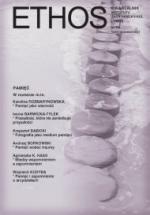 zobacz powiększenie | DOI 10.12887/34-2021-3-135-09 Marta BARANOWSKA, Towards virtù grande: Memory in Niccolò Machiavelli’s Political Universe Cena brutto: 7,00 PLN za szt. |
|
The objective of the present article is an analysis of the phenomenon of memory, as reconstructed based on the treaties by Niccolò Machiavelli. Although the literature on Machiavelli’s output is extensive, the problem of his understanding of the functions of memory has not been studied. However, the issue in question is not insignificant, since Machiavelli holds that human beings can influence the universe of political life. In order to probe how Machiavelli approaches the issue of memory, the author first draws an outline of the research of memory as it is conducted in the humanities and in the sciences. The overview of the study of memory is followed by a scrutiny of Machiavelli’s views of man, the human nature, and the human potential, as well as the human creative capabilities. Against this background, memory comes to light as an identity element. Machiavelli claims that it is memory that determines an individual’s attitudes, character, and actions. Those who have a good memory are capable of realistic judgment and thus are more effective in controlling their lives and acting for the sake of the welfare of the State. Machiavelli believed that the universe of politics is determined by the memory of both politicians and those whom they govern. Consequently, he was an advocate of a ‘mixed regime’ and of the idea that all the citizens should be committed to the welfare of the State. If all the citizens have a good memory, held Machiavelli, they can determine the political universe and even make it better. A reconstruction of his observations and insights concerning memory attempted in this article complements the existing research on Machiavelli’s political and philosophical views.
Keywords: Machiavelli, politics, memory, virtù, identity Contact: Department of History of Legal and Political Thought and German Law, Faculty of Law and Administration, Nicolaus Copernicus University, ul. Władysława Bojarskiego 3, 87-100 Toruń, Poland Pliki do pobrania: » Baranowska.pdf | |
